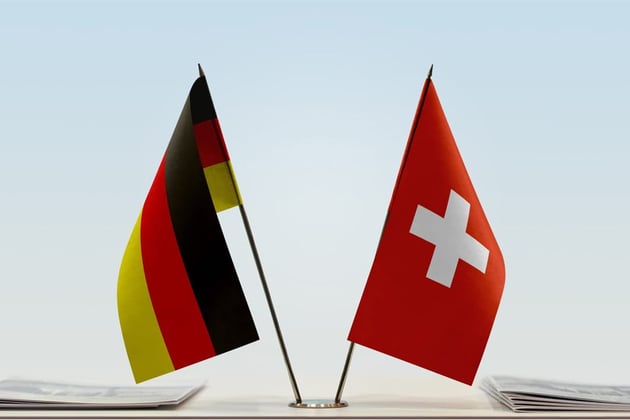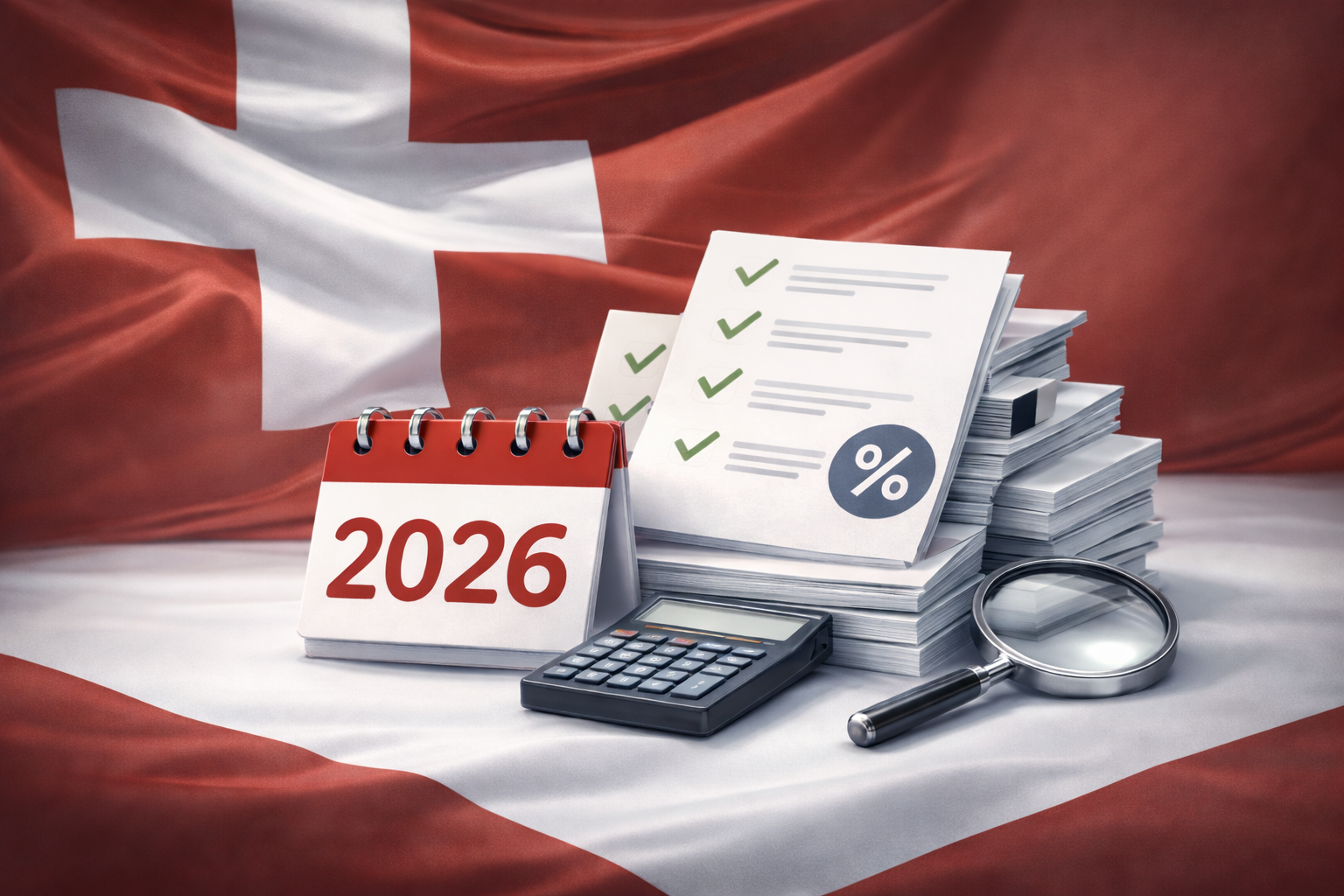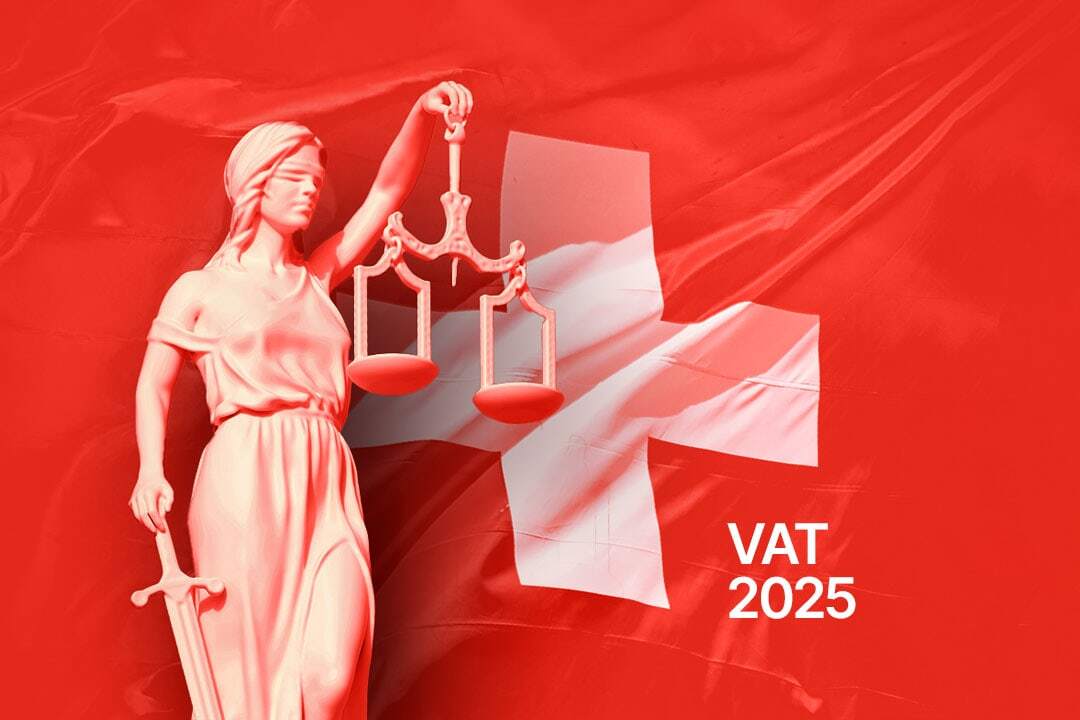With the start of the new year, a lot of retailers are working tirelessly to com...
Swiss customs regulations 2024: What changes apply to online retailers
The abolition of industrial tariffs on January 1, 2024 led to changes in customs regulations for Switzerland. In this article, we look at how the changes will affect German e-commerce retailers and show why it remains important to rely on competent partners for exports to Switzerland.

The abolition of industrial tariffs on January 1, 2024 led to changes in customs regulations for Switzerland. In this article, we look at how the changes will affect German e-commerce retailers and show why it remains important to rely on competent partners for exports to Switzerland.
What has changed for 2024?
The most important facts at a glance
The abolition of industrial tariffs is part of the "import facilitation" package of measures approved by the Swiss Federal Council in 2017. The background to the import facilitation package is the Federal Council's goal of reducing trade barriers. For German e-commerce retailers, this means simplifying the import of goods: Imports into Switzerland are attached to fewer customs regulations.
When the free trade agreement between the EU and Switzerland, signed in 1973, came into force, tariff barriers to international commerce between the two countries were already reduced.
These include lower customs duties or exemption from customs duties for certain imports and exports. The current abolition of industrial tariffs is a further boost for Germany to export to Switzerland.
The following changes are relevant for German e-commerce retailers:
The abolition of industrial tariffs
Import duties on industrial products are history since January 01, 2024. Industrial products include all goods that are defined as such in Tares (electronic version of the Swiss Customs Tariff). The abolition of industrial tariffs is specifically targeted at industrial products in customs chapters 25 to 97. For example, this also includes consumer goods such as clothing and electronics (e.g. leggings or a coffee machine) as well as production goods (e.g. a saw with an electric motor).
Products in chapters 35 and 38 are excluded. Switzerland continues to charge customs duties on products and goods in the fishery and agricultural products and animal feed categories. This includes, for example, nutritional products and food supplements with ingredients of animal origin.
Simplified customs tariff structure
As customs duties on industrial products have been abolished, there is no longer any need for subdivision on the Swiss sub-number. Six-digit customs numbers have replaced the previous eight-digit numbers. This simplifies the tariff structure. The Swiss customs tariff has been reduced from 6172 to 4592 tariff lines. Or to put it another way: 9114 tariff lines will become 7511.
However, this does not change the customs clearance processes. The bureaucratic effort for import and export has also remained the same. Only the Passar customs clearance system planned by Switzerland now simplifies import customs declarations.
Maintaining VAT with changed VAT rates
The VAT rates in Switzerland also changed on January 1, 2024. The Swiss population approved this in a vote in 2022. From now on, cross-border retailers must show the updated VAT rates on invoices to Swiss customers if they are subject to VAT.
Information on the changed VAT rates in Switzerland since January 01, 2024:
- Standard VAT rate: from 7.7 % to 8.1 %
- Reduced VAT rate: from 2.5 % to 2.6 %
- Special rate: from 3.7 % to 3.8 %
What impact do the new customs regulations have on e-commerce between Germany and Switzerland?
The one-sided reduction in import duties has made the Swiss economy more attractive for cross-border e-commerce.
Increasing purchasing power of Swiss customers
As a comparatively small industrialized nation, Switzerland is dependent on the import of goods from cross-border areas. Companies on a global level, including cross-border online retailers from Germany, are now benefiting from the changes to customs legislation. This is because companies tend to pass on the money saved on import duties to their customers. This means that since the amendments, it is it is even more affordable for the Swiss to make cross-border purchases.
Germany is already Switzerland's most important trading partner. A Statista survey conducted in 2023 on the international purchasing behavior of the Swiss concluded that 71 % of the respondents had ordered goods from Germany in the last 12 months. This also makes Germany the most popular import nation among Swiss consumers.
Analysts are already assuming that the tariff reduction will result in annual savings of around 350 million CHF for Swiss consumers. German e-commerce retailers can use this increased purchasing power to strengthen their market position in Switzerland.
Tip: Read our magazine article on "Shipping to Switzerland" for more information on cross-border sales to Switzerland.
Elimination of proof of preference
As the duty rate for imports of industrial goods into Switzerland is now zero, preferential proofs of origin are initially no longer necessary. However, this only applies as long as the imported goods remain in Switzerland. If the Swiss decide to return the ordered industrial goods, only those goods that have a proof of origin will retain their preferential status.
The "identity assurance" is a stumbling block here. Cross-border traders must prove to customs that the condition of the returned goods is unchanged. This is associated with increased effort as part of the usual collective customs clearance process.
This means that German e-commerce retailers only have the potential to make administrative savings in cross-border business when importing goods - and these savings are virtually null and void, as proof of origin must still be presented in the event of returns.
Why do online retailers still need a competent partner?
Despite simplified customs rates, there is no simplification in the delivery processes. On the contrary, the customs regulations are associated with an increased administrative burden , at least in the medium term.
Traders from Germany had to familiarize themselves with the new customs tariff structure. Errors quickly occur in the processing. Leaner administrative processes are not to be expected in the future either. For example, any eco-taxes would place an additional burden on cross-border traders.
With a competent customs partner like exporto, e-commerce retailers avoid the legal and financial consequences of incorrect processing and choose secure processes:
- With exporto, you can comply with all formalities thanks to forward-looking planning.
- exporto provides customs with all the necessary documents without you having to do anything.
- The proximity to customs and regular exchanges ensure fast contact channels.
- By means of individual customs clearance, exporto guarantees fast processing of returns.
exporto as an agile partner for customs clearance
If you commission exporto as your customs partner, we will take care of all the process steps involved in crossing the border for your shipment. For you, this means that serving Swiss customers is just as easy as selling to customers resident in Germany.
Compared to a freight forwarder, we take care of all cross-border processes in the mail order business for you. This makes the addition of other service providers obsolete. We set up our processes in such a way that you save time, personnel and costs:
- Once onboarding is complete, we have all the documents, forms and papers required for legally compliant customs clearance.
- We transmit the papers and documents to customs purely digitally in automated processes.
- Our team is in daily contact with customs and clarifies all queries from the customs authorities directly and in the shortest possible time.
Of course, we also take into account Switzerland's updated customs regulations. Thanks to our intelligent technologies and proximity to customs, we are able to react quickly and in a legally compliant manner to (future) changes.
At the core of the exporto technology is customs tariff number intelligence, which has a connection to the product catalog. The system adds the relevant information and customs tariff numbers independently and scalably. The technology has been developed over many years and is enriched with millions of pieces of data. This enables us to take over and guarantee the automated changeover to the new, reduced customs tariff numbers for our customers.
Individual customs clearance via exporto using the example of KoRo
While the new customs regulations have made it easier for German retailers to import goods into Switzerland, the old returns conditions still apply. The classic collective customs clearance procedure costs you money and time. If there is an inspection, entire truckloads are affected by the delays.
exporto, on the other hand, handles all customs declarations using the individual customs clearance procedure. In the event of an inspection, customs only checks individual parcels and the truck is allowed to continue its journey. This allows you to process all returns quickly and reliably despite an inspection.
The advantages this offers are shown in our case study with the food mail order company KoRo: Processing using the individual customs clearance procedure has reduced Koro's delivery times to Switzerland by one day and to the UK by two days. Thanks to automation, the entire process is now less prone to errors and manual data transmission is no longer necessary.
Conclusion: cross-border e-commerce in Switzerland is now even more attractive
Swiss consumers are the main beneficiaries of the changed customs regulations. This increases the purchasing power of customers who already have a cross-border affinity. Thanks to the elimination of customs duties, it makes no difference to them whether they order from a regional or international online store.
German e-commerce retailers can make efficient use of the resulting potential if they rely on transparent and intelligent partners such as exporto, who take care of all administrative customs, logistics and tax processes. This means that you do not incur any additional costs when selling to Switzerland, only potential.
FAQ Customs regulations for Switzerland in 2024
What counts as duty-free industrial products in Switzerland?
Industrial goods in customs chapters 25 to 97 (with the exception of chapters 35 to 38) have enjoyed unilateral duty-free treatment in Switzerland since January 1, 2024.
What is the import VAT rate in Switzerland?
Imports into Switzerland are subject to import tax in the amount of VAT. The current standard tax rate is 8.1%, while the reduced VAT rate is 2.6%.
How much do the amended customs regulations simplify customs clearance processes?
The change in the customs tariff and associated measures have primarily simplified customs clearance processes for Swiss companies and consumers. For cross-border traders, the simplification is limited exclusively to the abolition of industrial tariffs. There are currently no administrative simplifications in the context of supply chain management.
About the Author

Katharina Knoop
As Senior Marketing Manager for exporto GmbH, Katharina Knoop is coordinating the planning, production and publication of content relating to all aspects of cross-border e-commerce for over 4 years.
Cross-border insights straight to your inbox
Related Posts
Answers to the most common questions from online retailers
7 minute read
Opportunities and strategies for German online retailers






Comments